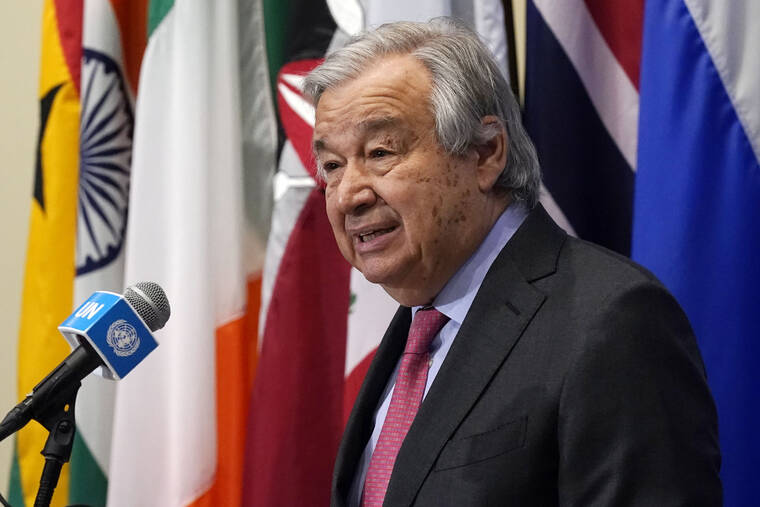Russia seeks UN humanitarian resolution not mentioning war
UNITED NATIONS — Russia circulated a proposed U.N. Security Council resolution Tuesday demanding protection for civilians “in vulnerable situations” in Ukraine and safe passage for humanitarian aid and people seeking to leave the country, but it make no mention of Russia’s responsibility for the war against its smaller neighbor.
The draft resolution endorses U.N. Secretary-General Antonio Guterres’ call for dialogue and negotiations and calls for a negotiated cease-fire to rapidly evacuate “all civilians,” and underscores “the need for the parties concerned to agree on humanitarian pauses to this end.” But it never identifies “the parties concerned.”
The draft expresses “grave concern” at the deteriorating humanitarian situation and reports of civilian casualties in and around Ukraine, and strongly condemns “attacks directed against civilians and civilian objects, including indiscriminate shelling.”
Russia’s U.N. Ambassador Vassily Nebenzia told reporters the resolution was being put in a final form that can be put to a vote on Tuesday, and a Russian diplomat said a vote could take place as early as Wednesday.
Britain’s U.N. Ambassador Barbara Woodward tweeted that the Russian draft “has a few glaring omissions. For example, the fact that Russia is the aggressor here, and it is Russia’s invasion driving this humanitarian crisis.”
The Russian draft was circulated a day after France and Mexico announced that a humanitarian resolution on Ukraine they cosponsored, which had been discussed for two weeks in the 15-member Security Council was being moved to the 193-member General Assembly.
The France-Mexico draft resolution would demand “an immediate cessation of hostilities” and deplore “the dire humanitarian consequences of the hostilities against Ukraine” and would almost certainly have led to a Russian veto. Those provisions are not in the proposed Russian resolution.
France’s U.N. Ambassador Nicolas De Riviere told reporters: “Obviously, it would have been difficult in the Security Council.”
By taking the draft resolution to the General Assembly where there are no vetoes, the cosponsors lose the prospect of the resolution being legally binding, as Security Council resolutions are. But they could gain massive support for a call to halt violence and for deploring the dire humanitarian situation sparked by the war. Diplomats said Tuesday a vote in the General Assembly will take some time.
Nebenzia told reporters that the French and Mexican ambassadors knew from the beginning that “we would be prepared to adopt a humanitarian resolution on the situation in Ukraine, provided that this is not a disguise to blame and shame Russia.” He said they know that paragraphs in Security Council draft “which are not humanitarian” and shouldn’t be in a humanitarian resolution.
Russian authorities maintain that they did not start the war and have repeatedly and falsely decried reports of Russian military setbacks or civilian deaths in Ukraine as fake news, as well as denouncing reports calling the offensive a war or an invasion. State media outlets and government officials insist the Russian forces only target military facilities.
Nebenzia said Russia thinks “the chances are still there” for the Security Council to adopt a humanitarian resolution, so it was putting forward its own resolution “with clear humanitarian provisions” and will see whether the council adopts it.
To be approved, the resolution needs at least nine “yes” votes and no veto by another permanent council member — the United States, United Kingdom, France or China.
Olivia Dalton, spokesperson for the U.S. Mission to the United Nations, called it “unconscionable that Russia, the aggressor responsible for creating this crisis, would have the audacity to put forward this resolution.” She said the United States will work with other countries for a General Assembly resolution “that will more accurately reflect the views of U.N. member states” about the impact of Russia’s “unprovoked aggression.”
The Russian draft resolution also demands that “all parties concerned” respect international humanitarian law, which requires protection of civilian infrastructure “indispensable to the survival of the civilian population” and “critical to enable the delivery of essential services in armed conflict.”
It demands that all parties — again unnamed — “refrain from deliberately placing military objects and equipment in the vicinity” of civilian infrastructure or in densely populated areas, “as well as not to use civilian objects from military purposes.”
The Russian draft also calls on “all parties concerned to allow safe and unhindered passage to destinations outside of Ukraine, including to foreign nationals without discrimination,” and to facilitate humanitarian aid to all in need in and around Ukraine.
And It asks the secretary-general to report on the resolution’s implementation within seven days “and regularly thereafter.”

